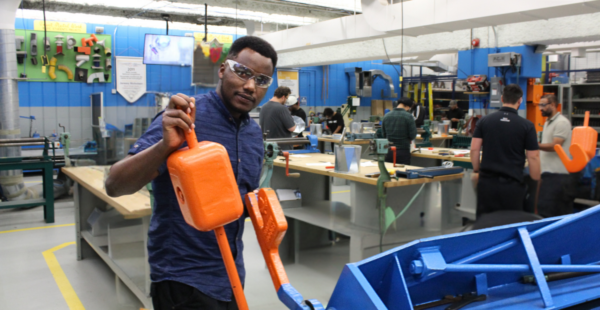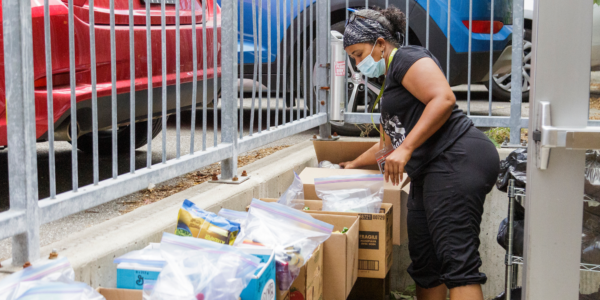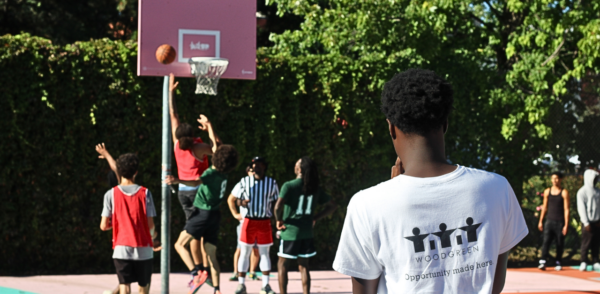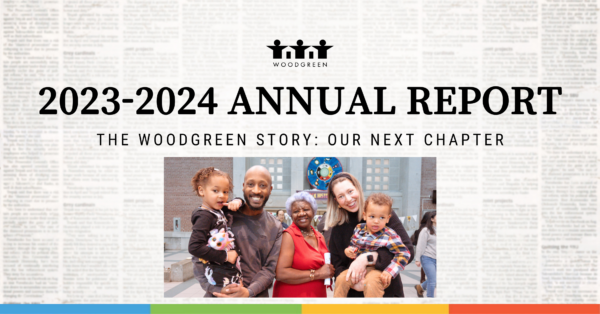Every year Canada welcomes intelligent, highly-trained professionals as newcomers to this country. But some say language and cultural barriers can keep them from showing just how skilled they truly are.
It’s why WoodGreen has developed a program that’s effectively a free crash course in Canadian corporate language, hiring practices and culture for newcomers.
The Enhanced Language Training (ELT) program is targeted at internationally-trained newcomer professionals. It offers sector-specific language training and job search preparation as well as coaching in Canadian workplace culture. It is open to all permanent residents, convention refugees or Ukrainian temporary residents. We checked in with graduates of the three-month program to see the impact their WoodGreen experience had on their life in Canada.
WASS AKADIRI
Before he left Benin to come to Canada in 2015, Wass Akadiri had a successful career as a bank branch manager specializing in commercial lending. His skills were top notch; his English language skills? Not so much. Like many newcomers, he started his search for employment with an English language assessment at the YMCA. That's where he heard about WoodGreen’s ELT program.
“The first goal was to improve my communication skills and then, at the same time, learn about the culture,” he said.
Akadiri had surpassed the minimum language requirement for the ELT course; Canadian Language Benchmark Level 5 (Intermediate). He also had the required industry-related training or work experience to enter one of the program's two streams: Finance & Accounting or Office Administration and Customer Service.

Newcomers admitted in quarterly cohorts
The course admits cohorts of 20 people every three months. The financial stream is essentially a full-time day program, with workshops from 10 a.m. to 3 p.m. Monday through Thursday. The Office Administration and Customer Service segment is geared toward those who may already be working. The part-time hours are Tuesday and Thursday evenings 6-8:30 p.m. and Saturday 9 a.m. to noon.
The program is made up of two parts: a) a classroom component and b) an employment component. The classroom focuses primarily on developing soft skills (communication and cultural awareness) for the Canadian workplace.
“They’re not focusing only on how to do the job,” explains Akadiri, “but instead they teach you what you need to have in terms of knowledge for how to actually get the job.”
One-on-one sessions with an employment counsellor help newcomers learn what they need to actually work in their chosen industry in Canada and what employers will expect them to already know. They also examine what barriers to hiring that newcomers might not be aware of. Together with an employment counsellor, newcomers develop an action plan for how to become competitive job candidates by honing their self-marketing skills. Local professionals often volunteer their time and knowledge to help the newcomers improve their chances of being hired.
Avoiding cultural pitfalls
Akadiri credits WoodGreen trainers for helping him avoid major pitfalls that could have easily derailed his career as a professional. Akadiri says he learned that although in Benin, and his home country of Cote d’Ivoire, it might be acceptable to compliment a woman on the way she walks, doing so in Canada would be a workplace faux pas. Same goes for the wearing of fragrances, something Akadiri says would not have even occurred to him might be different in Canada.
“WoodGreen also taught me a lot about how to be assertive,” he says.
“Here in Canada, you are the owner of your own career. If you want to move up the ladder, that is up to you. But back home, it is the manager who decides when you get promoted, regardless of what you want.”
Focus on soft skills sets WoodGreen apart
Akadiri says it is these lessons in soft skills that set WoodGreen’s program apart from other newcomer language programs.
“I notice with my friends who didn’t go to WoodGreen, they complain that their manager isn’t happy with them or doesn’t like them, and then they ask me for advice or information on what they’re doing wrong.”
He says he has tried to pass on what he’s learned so that others can also more easily integrate into Canadian corporate culture, a place where he is now very firmly rooted.
“A lot of things I accomplished because of Wood Green. If I didn’t get that information right at the start, I don’t think I would be where I am now.”
Akadiri is now the Regional Director for BMO Nesbitt Burns in Montreal where he heads up a department of 20 employees.
“Without WoodGreen it would have taken me years and years and years longer to get to this position.”
ADRIANA MOLINA
Arriving in Canada in 2013, Adriana Molina had an accounting degree, an MBA and more than a decade of experience with some of the world’s leading financial institutions.
What she didn’t have was the coveted ‘Canadian work experience’ so many employers seemed to want.
“You think, as an immigrant, that you’ve been a professional for years and you know how to behave,” says Molina, who is originally from Brazil. “But each culture is a little bit different.”
She says sometimes it’s not clear to newcomers what part of their job search isn’t connecting with employers. Although other clinics offered to help with resume writing or mock interviews, Molina says it was often a very fragmented process.

Safe place for newcomers to ask questions
“WoodGreen’s ELT, with our instructor Roma, was a safe place where you could ask any questions and have a candid assessment in terms of what you’re doing. It really helped.”
Molina discovered that one area where she needed to adapt to the different Canadian corporate culture was in how she marketed herself to potential employers.
“I came from a collective-culture mindset,” she says. “If I accomplished something all by myself, in my home country I would say ‘we accomplished this, we the company,” says 45-year-old Molina.
“Here it’s more individualistic and I had a hard time with that...here you say “I did that”. It took me a while to take credit for things on my own.”
‘That Canadian culture voice in your head!’
After completing the three-month course at WoodGreen Molina went on to work for KPMG in Toronto. Then she went to MUFG Investor Services where her work included the valuation of hedge funds. She credits her WoodGreen instructor for helping her succeed in the corporate working environment. “You keep Roma’s voice in your head for life. She’s that Canadian culture voice in your head!”
Molina still keeps in touch with some of the other newcomers from her ELT cohort at WoodGreen.
“One thing we discussed a lot at ELT was the importance of networks,” says Molina. “Your first network is there at WoodGreen. We all come from different countries but we share the common goal of wanting to succeed in Canada in our profession.”
Molina is now the Director of Reporting and Analysis at Manulife. She and her Canadian husband bought a home in Toronto a few years ago and the couple plans to stay in the city until they retire.
WoodGreen’s Enhanced Language Training program for internationally trained professionals is now accepting applications for its next session, which begins in April 2023. The program is free and open to all permanent residents, convention refugees or Ukrainian temporary residents.
You’ll find more information on the ELT program here and WoodGreen’s English Language Services here.





